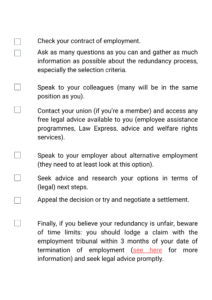Resource
Redundancy – what it is, your rights and accessing support
Been made redundant? Worried that this might happen to you? We’re here to help.
We have recently had an increased number of enquiries from individuals telling us that they are worried that they are going to be made redundant, or indeed wondering what to do next if this has already happened.
Did you know?
In the UK there are 5 ways in which employment can be terminated?
- Resignation
- Dismissal
- End of a fixed-term contract
- Redundancy
- Retirement
There is more information about different types of dismissal here. You can check if your dismissal is fair here.
Redundancy – What is it?
Redundancy is a form of dismissal from your job which usually happens when an employer needs to reduce their workforce. It might be because your employer:
- doesn’t need as many people for the work
- is trying to cut costs
- is moving, closing down, or being taken over
Redundancy is different from a dismissal due to your performance or conduct. In these cases employers must have followed a disciplinary or capability procedure. It is one of five potentially fair reasons for an employer to dismiss an employee.
Just because you have been made redundant, doesn’t mean your dismissal is fair.
To decide whether a redundancy is fair, you have to look at three questions:
Time to talk about redundancy
Whether expected or sudden, redundancy can cause huge uncertainty, stress and anxiety, not just for individuals at risk of redundancy, but for the whole practice. It’s important to think about the impact of redundancy on both an personal, as well as an organisational level.

The mental health charity MIND has some good advice on a personal level.
Losing a job is a huge adjustment and it’s normal to experience lots of emotions. You might feel shock, anger, resentment, and relief, all in a short period of time.
Give yourself space and time to think about and express these feelings. You might find it helpful to talk to other people about what you’re experiencing. Being made redundant is nothing to be ashamed of. You’re not to blame. Having some social support might help you to cope.
Being out of work can have a big impact on your self-esteem and sense of identity. If your job has always been a big part of your life, you may wonder who you are without it. Be kind to yourself during this time. You could use it as a chance to reflect on what makes you feel happy and fulfilled. Perhaps you could write a list of all the skills and qualities you have, and take a moment celebrate to them.
At ABS we offer support that helps architectural professionals to manage their mental wellbeing, as well as find alternative employment. You can speak to a member of our welfare team in confidence as a first step. We don’t offer counselling ourselves, but we are good listeners and sometimes it can help just to talk to someone, unconnected with your family or work life. If your redundancy has had an impact on your mood or increased your anxiety levels, we can also make a referral to our partners, Anxiety UK for therapy
Redundancies impact people at the basic level of physiological needs, such as food, water, warmth and rest. It’s a significant psychological shock. Psychological safety means, the absence of interpersonal fear. Feeling psychologically safe allows people to perform their best at home, school, and work.
It’s not difficult to see how redundancy can have a profound impact on everyone in a practice. If there is talk of redundancy, or you know that members of the team are ‘threatened’ with redundancy, you’re unlikely to take interpersonal risks, to speak up, to disagree openly or to surface concerns without fear of negative repercussions. You’re also less likely to be at your most productive, creative or innovative.
Madeleine Stevens, in an article for the British Psychological Society talks about the concept of ‘psychological safety’.
There is an expectation by employees that employers will provide security of employment and a safe environment. Redundancy isn’t like misconduct, where employees are culpable for their own actions. In the case of redundancy, the situation arises without any fault of the employee, and the employer removes the employee’s control over the situation. The psychological contract is severely impacted, and repairing the relationship is extremely difficult.
It won’t come as a surprise that communication is central to supporting members of your team during redundancy, but there are other ways in which the impact of redundancy on mental wellbeing can be minimised.
- Open communication – provide employees with clear information about the redundancy process, such as the reasons for the redundancy, the selection criteria, and the timeline.
- Support services – proving access to quality, accessible mental health support. This might be through an Employee Assistance Scheme or making sure that your employees know about the support that ABS can offer, through our partnership with Anxiety UK.
- Outplacement support – this might be available through your company, but ABS can make referrals to a company called, Renovo. This will enable individuals to access quality coaching and job search support.
- Manage the process fairly and ethically – transparency, as well as ensuring that you have behaved inline with legal requirements.
- Empathy, dignity and respect – you have a job to do, but treating people with humanity is essential.
- Look after yourself – it’s a difficult process, so seek support for yourself.
In these difficult financial times, most of us don’t have savings to fall back on when threatened with a loss of income.
! Don’t wait to seek advice and support with your financial affairs. !
You’ll obviously be desperate to find another job. However, don’t delay seeking advice and support with your finances. Hopefully, you’ll find another job soon, but the recruitment process, and delays until you receive your first salary mean that you’ll need to take stock of everything. Here’s a checklist of things to think about and where to find support.
Benefits – you might be entitled to some support from the State. Check your entitlement here .
We also have specialist Welfare Benefits Advisors who can help if you run into any difficulties or just want some advice.
Budgeting – even if you’ve never budgeted before it’s never too late to begin and budgeting is the first step to managing your money. It will help to prevent your financial situation getting out of control. There are many different tools online, but try this.
Debts – try and seek advice about managing your debts as soon as possible.
Take this 60 second debt test and take action. If you take your debts seriously, by seeking support, creditors will be more likely to take you seriously.
Finally – Talk to our welfare team. If you contact us, having been made redundant, as well as supporting you to access a range of services to meet your mental health, job search and money management needs, we may be able to provide short-term financial support.
Redundancy – your rights
If you’re faced with redundancy, your employer must treat you fairly and act according to your contract and legal redundancy rights. That includes making sure you’re consulted, following the right selection process and giving you a proper notice period. If not, you could have a claim for unfair dismissal, or claim compensation for lack of consultation.
-
Fair process

Your employer must use a fair and object way of selecting job roles to make redundant, and tell you what it is.
 Your employer is not permitted to make this selection on the grounds of age, race or gender – or your employer has acted unfairly in other ways, you can normally appeal. If you’re still not satisfied, you can take your employer to a tribunal.
Your employer is not permitted to make this selection on the grounds of age, race or gender – or your employer has acted unfairly in other ways, you can normally appeal. If you’re still not satisfied, you can take your employer to a tribunal.
-
Minimum notice period
What is it? The notice period is the amount of time between when your employer tells you that you are being made redundant and your last working day.

According to redundancy law, you’re entitled to a minimum notice period of:
- 12 weeks’ notice if you’ve been employed for 12 years or more
- at least one week’s notice if you’ve been employed between one month and two years
- one week’s notice for each year if you’ve been employed between two and 12 years.
Check your contract – Your contract of employment could state that you are entitled to a longer period of notice.
-
Consultation

Your employer must tell you what’s going on and give you a chance to ask questions and raise objections.
If you’re in a small practice of less that 20 employees, your employer needs to consult with you individually, within a reasonable time. For larger companies, there will need to be a collective consultation and time-frames will depend on the number of employees in the practice.
-
Redundancy pay

If you’ve worked for your company for more than two years you are entitled to statutory redundancy pay, which is calculated according to a formula.
Use the calculator here to check what you should receive.
-
Time off to look for paid work

You’re entitled to paid time off to look for work or have training. The amount of time you can take off has to be reasonable.
This advice applies in England, Wales and Scotland. If you live in another part of the UK, the law may differ and it is important to speak to someone able to provide advice based on the law where you live. If you are in Northern Ireland you can visit the Labour Relations Agency or call their helpline Workplace Information Service on 03300 555 300.

Dani contacted us in early January in crisis. After working as an architect for over a decade for the same practice, she wanted a change and accepted a role at a new firm. Within only a few months, she was made redundant, with no right to redundancy pay. Her husband had also been made redundant only months earlier and was working on a freelance basis, on a very low income.
Dani and her partner had two young children and a mortgage. We supported the family by providing a grant which would cover their mortgage and contribute to their living expenses, agreed for 3 months. We also referred Dani to our partner Agency, Renovo, who provide a career coaching service.
Renovo supported Dani to explore employment opportunities and options. Dani knew she wanted to remain working within architecture, but still longed for a change of pace. After long discussions and a lot of research Dani decided she wished to move into teaching, and enrolled for her studies part-time at university, due to begin in 2024. Meanwhile, with Renovo’s job search support, Dani found a new job within 6 weeks as Project Architect at a new practice. She is thoroughly enjoying her new position and her new employers are very supportive of her plan to train to teach.
Dani continues to access Renovo, she has found them to be very helpful, reporting that ‘Katie from Renovo is helping me to focus on how to be successful in my new role, and continuing to develop professionally in order to pursue other opportunities, including teaching.’
Dani told us that as a result of the short-term support from ABS, she and her partner’s stress was alleviated and it prevented them from falling into debt. She felt that she could manage home life better, balancing time with her children and focusing on searching for a job and developing longer-term career goals.
Where to get support
Legal
There are lots of excellent online resources which will help you to understand whether you have been made redundant and what your rights are. However, employment law is complex and it is important to obtain the best advice, especially if you are thinking about making a claim to an employment tribunal. Here at ABS our Welfare caseworkers are not able to provide legal advice, but we have a partnership with Law Express which will give you access to free telephone legal advice and guidance on employment issues (and other legal matters).
How to use the service:
All Law Express advisers and call handlers are based in the UK (and cover all UK jurisdictions). When you call Law Express, a call handler will ask you some questions about the nature of your enquiry so that they can match you to the best adviser. An experienced legal adviser who specialises in the area of law that you need will call you back, usually within 2 hours. If you wish to speak to an adviser straight away the call handler will do their best to help you.
Is this service confidential?
Any contact you make is completely confidential. The details of your conversation remain personal to you and will not be released to anyone else.
Do I have to pay for this advice?
Architects Benevolent Society will cover the cost of this service for you. All you need to do is contact the Welfare Team, provide some information about your work background and tell us that you would like some advice about employment matters. We’ll then provide you with the contact details for Law Express and a code which will let Law Express know that we’ve referred you.
Other sources of support
If you need further legal advice or are thinking of making a claim to an employment tribunal here are some other sources of free advice

Law Centres Network
Enables you to search for local Law Centres.
What’s a law centre? Law Centres employ lawyers and other professionals, who are experts in this kind of everyday problem. They give people legal advice and can represent them if they need it. They use the law to solve problems that hold people back, so they can get on with their lives.
ExploreState Support
Your local Council may well have a welfare rights unit providing help and advice. You can find your local Council here.
To qualify for financial help from ABS you would be expected to claim any welfare benefit support you are entitled to. Financial support from ABS is intended to be in addition to state support, rather than replace it. Any regular financial support from a charity is disregarded for the purposes of means tested benefits, so any such help would not affect your state benefit entitlement.
It is likely that if you have recently become unemployed but are fit to work you would need to apply for either ‘new style’ (i.e. contribution based) Job Seekers Allowance (JSA) and/or Universal Credit (UC).
When applying for Universal Credit there is a five-week period when, even if entitled to help, you will not get any financial support. Your claim starts from the date you first apply. ABS can look at helping financially whilst you wait for an award to be made, if needed.
If you are thinking of applying for Universal Credit as a self-employed person, we would recommend that you speak to one of our Welfare Caseworkers first as the way this benefit works for self-employed people is different.
Redundancy FAQs
1 – Is the selection fair?
A ‘selection pool’ is a group of employees who are at risk of redundancy. The selection pool may be made up of people of a similar grade, role or project. Equally, the pool may be very mixed.
Your employer may use a set of agreed criteria to decide who should be made redundant from the pool. They cannot use criteria that discriminates against you in any way. For instance, you cannot be selected based on any of the following:
· age
· gender status
· relationship/marital status
· pregnancy or maternity · disability
· Ethnicity or nationality
· religion
· sex
· sexual orientation
This process should be fair and transparent, further information can be found on acas.org.uk
If your performance is the real reason for why your employer wants to terminate your employment then it is not a redundancy and your employer is at risk of a claim. For capability dismissals employers should follow the Acas code of practice, which provides for a number of warnings to be given and an opportunity to improve. It is for this reason that some employers will want to bypass this potentially lengthy process and label your dismissal a “redundancy”, but with the full intention of replacing you.
Length of service used to be one of the most common ways of deciding which employee to make redundant. Whilst this is still legal, it is generally no longer considered to be a fair or appropriate system for selecting possible employees for redundancy. It is important to understand the system or matrix that has been developed for redundancy in your workplace, and this largely relies on good communication and transparency from your employer.
2 – Am I being discriminated against?
Yes you can, provided the role has genuinely ceased to exist and you have not been selected because of your pregnancy, maternity or illness alone. Your employer still has to follow a proper process (including consultation) and you should not have been disadvantaged by the redundancy selection criteria, otherwise you may have a claim for discrimination. There is no qualifying period of service for a discrimination claim.
When consulting with staff regarding redundancy, employers will still need to include those on maternity leave as part of the process even if they are not physically at work. Although they are not afforded protection from dismissal on grounds of redundancy, employees on maternity leave are generally entitled to be offered a suitable alternative vacancy (where one is available) ahead of others also at risk of redundancy.
No. Your employer could be guilty of age discrimination if your age is the sole reason (or a factor) for dismissing you.
3 – What are my rights
No, your employer cannot insist on this but you do need to be given the opportunity to participate in consultations. Often a team will nominate a representative to attend consultation meetings and report back, but you usually have the right to attend too. There are set rules for large-scale redundancies, known as ‘collective redundancy’, which generally only consult with representatives.
You are only entitled to statutory redundancy pay once you have worked for your employer, as an employee, for two years. If your employer has their own enhanced redundancy scheme, you may be paid redundancy pay with less than two years service.
If you feel that your employer has not followed a fair redundancy process or you believe you have been unfairly selected for redundancy, you can appeal against the redundancy decision. You should first check if your employer has an appeals process, and if not, you should write to them explaining your reasons for appeal. Your employer must confirm in writing whether they accept or reject your appeal. If they reject your appeal and you still
believe your redundancy is unfair, you can apply to an employment tribunal. Ensure you access suitable advice if considering applying to a tribunal.
4 – Other questions
Check the terms of your contract of employment. Many employers reserve post-termination covenants to stop you taking clients with you, and such restrictions are generally drafted to last between three and 12 months after the employment has ended. Not all employers have clear policies on this, and some may not be enforceable. It is always best to take advice if you are not sure. Many employers appreciate the value and importance of allowing employees to access their portfolio, but they are not under a legal obligation to do so. Speak to your employer about this at the earliest opportunity.
You may be able to make a legal claim for money owed. This should be done as quickly as possible in order for what is owed to be registered as a debt if/when assets are liquidated by your employer.
If you have worked for your employer for more than two years, you should then make a claim online for statutory redundancy pay and consider applying for benefits until you find work, such as Universal Credit.
In the first instance, you should consult your PSA (Professional Studies Advisor). ARB does not require that candidates are in employment whilst undertaking their Part 3 so long as the experience requirements have been met (particular note should be made of the requirement for 12 of the 24 months’ experience having been undertaken in the two years immediately before taking the Part 3 exam). Therefore, subject to your prior experience and Part 3 course provider regulations, you may find that you are able to remain registered on your course and complete Part 3. https://arb.org.uk/wp-content/uploads/2016/05/PTR_FAQS1.pdf







